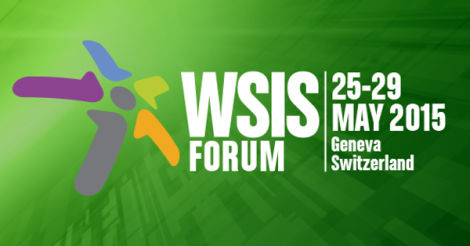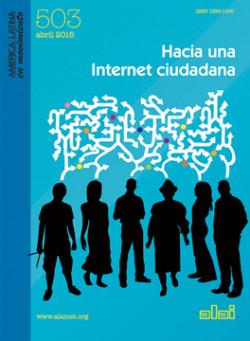WSIS+10: issues, actors, what to expect, what to achieve
WSIS debates tend to reproduce the debates that occur in other forums, and the split in views can be characterized as North/South: developed countries versus developing countries.
- Análisis

| Article published in ALAI’s magazine No. 503: Hacia una Internet ciudadana 28/04/2015 |
What is WSIS+10
The World Summit on the Information Society (WSIS) was a meeting of heads of state that took place in 2003 and 2005. It was initially intended to focus on agreeing ways and means to facilitate the development of the information society, in particular how to facilitate the rollout and implementation of information and communication technologies (ICTs) in the developing world. But, due to the unwillingness of developed countries to contribute funds towards that end, and due to the unilateral US decision to maintain control of the management of Internet domain names and addresses, much of the discussion turned to the question of Internet governance, which is a contentious topic.
Despite the differences of opinions regarding Internet governance, agreement was reached on a number of topics related to the development of ICTs. These agreements are embodied in the 2005 Tunis Agenda.
It was always foreseen that there would be a review of the progress made, and indeed in August 2014 the UN General Assembly agreed in its Resolution 68/302 to conduct an overall 10-year review.
Separately from that, UNESCO hosted a WSIS+10 Review Event in February 2013, the International Telecommunication Union (ITU) hosted a High-Level event in June 2014, and UNESCO hosted a Connecting the Dots: Options for Future Actions event in March 2015.
The outcome of the ITU event, which was agreed following an open multi-stakeholder process, was a statement, outlining progress to date, and a vision, outlining future steps to be taken within the context of the Tunis Agenda. While those outcomes were unanimously agreed, some stated that the outcomes should have included stronger language on some issues, such as protection of all human rights, taxation of the digital economy, reform of copyright laws, reform of IANA and ICANN, and recognition that the principles of necessity and proportionality must apply to surveillance activities. The outcome of the March 2015 UNESCO event was a statement outlining possible future actions for UNESCO, but that outcome statement did not obtain the consensus of all participants, in particular because it did not explicitly recognize that Internet governance must be democratic.
What are the issues in WSIS+10?
The UN General Assembly decided that the overall review in December 2015 would address potential information and communications technology gaps and areas for continued focus, as well as addressing challenges, including bridging the digital divide, and harnessing information and communications technologies for development.
While “Internet governance” is conspicuously absent from this list of issues (no doubt because the US is opposed to discussing that topic in a multilateral venue), it is likely to come up within issues such as “bridging the digital divide” and “harnessing ICTs for development”, just as it did at the original WSIS.
Regarding the development issues, it is likely that the differences of views that have been aired in various forums for development issues in general will be repeated: the one side holds that deregulation and privatization is the best solution; the other side holds that, absent appropriate government regulation, deregulation and privatization may simply increase corporate profits without bringing corresponding benefits to citizens.
The objection of the Just Net Coalition to the UNESCO Connecting the Dots outcome statement is an example of such divergent views.
In terms of specific issues, the ones that are most likely to be discussed are exactly the same ones that were identified in 2005 by the Working Group on Internet Governance: the asymmetric role of the United States, the relatively high cost of connectivity for developing countries, and security (which now includes the privacy and mass surveillance issues). These issues have been extensively discussed during the past 10 years. Although proponents of the current governance arrangements take the view that there has been some progress, this is not actually the case: there has been no progress. Thus these issues are likely to be discussed yet again in the UN WSIS+10 review.
Who are the actors in WSIS+10?
Up to now, the WSIS process has been quite open, inputs from non-government actors (private companies and civil society) are accommodated, so the documents represent a general agreement amongst various types of actors. This tradition is somewhat reflected in the August 2014 UN resolution, which decided that the overall WSIS review will be concluded by a two-day high level meeting of the General Assembly in December 2015. This is to be preceded by an intergovernmental preparatory process that also takes into account inputs from all relevant stakeholders of the World Summit on the Information Society; it was also decided to invite representatives of all relevant WSIS stakeholders to speak during the high-level meeting, and to encourage the participation of those stakeholders in the meeting.
But it remains to be seen how that tradition will be reflected in practice, because the modalities of participation by non-governmental actors have not yet been specified, and because the preparatory process, which will start only in June 2015, will be an intergovernmental process, resulting in an agreed outcome document for adoption by governments at the high-level meeting of the General Assembly. During the preparatory process for the high-level meeting, the President of the General Assembly will organize informal interactive consultations with all relevant WSIS stakeholders, in order to collect their inputs for the intergovernmental negotiation process, but the modalities for these consultations have not yet been announced.
What to expect in WSIS+10?
As mentioned above, WSIS debates tend to reproduce the debates that occur in other forums, and the split in views can be characterized as North/South: developed countries versus developing countries (with the BRICS being aligned with the developing countries).
As already mentioned, much of the debate focuses (whether openly or under the surface) on the Internet. Developed countries view this technology as an enabler of growth, the continuation of which will only be ensured if governments continue to refrain from intervention. But in reality mobile is more important, at present, in developing countries. And developed countries favor interventions in Internet matters when it suits their interests, in particular strict enforcement of intellectual property rights.
Thus there likely will be a clash between forces that favor an international neo-liberal regime model (called “multi-stakeholder model” when Internet matters are discussed) in which the US and its private companies dominate, versus forces that favor democratic governance models.
What to achieve in WSIS+10?
From the perspective of social movements and civil society actors that strive for social and economic justice, and groups that wish to see the Internet become a technology developed by the people for the people (such as the Internet Social Forum), the tendency of the US and its allies to push for governance models that favor their geo-political and geo-economic interests should be resisted, and there should be agreement on basic principles that will lead to equitable and just use of ICTs and protection and realization of all human rights.
Article published in: Latin America in Movement 503, ALAI, April 2015. “Towards a people’s Internet” http://www.alainet.org/en/revistas/169787
Del mismo autor
- A new convention for data and cyberspace 07/05/2021
- Una convención sobre los datos y el ciberespacio 06/05/2021
- Trump and CDA Section 230: The End of an Internet Exception? 31/07/2020
- Governing the digital world: Lessons from last year’s WTO Public Forum 23/01/2020
- Data as a commodity 30/07/2019
- Some thoughts on cyber-war 28/09/2018
- Reflexiones sobre la ciberguerra 27/09/2018
- The Politics of Internet Governance: Imperialism by Other Means 29/11/2017
- La política de la gobernanza de Internet: el imperialismo por otros medios 28/11/2017
- Necesitamos normas internacionales vinculantes para las ETN digitales 26/10/2017
Artículos relacionados
Clasificado en
Clasificado en:
Comunicación
- Jorge Majfud 29/03/2022
- Sergio Ferrari 21/03/2022
- Sergio Ferrari 21/03/2022
- Vijay Prashad 03/03/2022
- Anish R M 02/02/2022
Internet ciudadana
- Nick Bernards 31/03/2022
- Paola Ricaurte 10/03/2022
- Burcu Kilic 03/03/2022
- Shreeja Sen 25/02/2022
- Internet Ciudadana 16/02/2022

